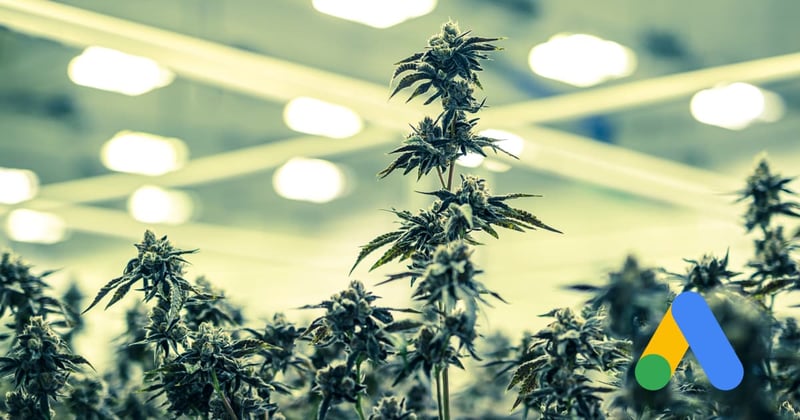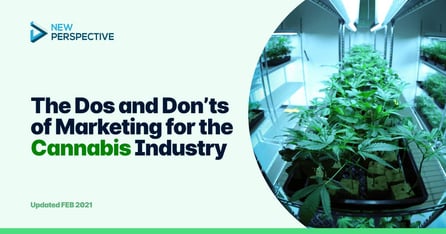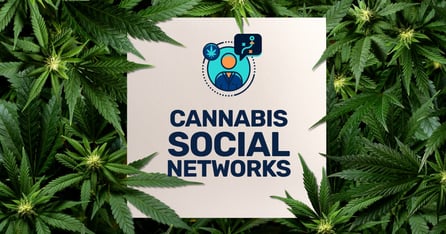Running Cannabis Google Ads: Everything You Need To Know

What’s the first place most people search for products and services? Google. It’s by far the most used search engine, with a market share of over 92%. For this reason you’d think it should naturally be the best place to advertise your cannabis products and services.
But, there’s a hitch: Google severely restricts the advertising of anything cannabis-related. So what can you do? That depends on your unique situation and your aversion to risk. Finding the best solution requires a baseline comprehension of how Google’s system works. Let’s dive in.
How Google Ads works
Google Ads is an advertising platform that allows you to present your product or service to people searching the internet for what you sell — when they’re most interested. You bid on keywords in an attempt to appear in the sponsored ad section of the search results — thus promoting your business to that potential customer.
A split second after a person types their query, Google compares what you’re willing to pay per click for that keyword (among other factors, like your ad’s relevance to the search) against what your competitors are willing to pay. That’s what determines where on the page your ad will be displayed.
What does Google evaluate to approve and display an ad?
If your ad or landing page contains keywords or subject matter that Google’s policies do not allow, you will not be eligible for the auction, and your ad will not be displayed. And the platform has many different methods for finding banned topics and keywords. For instance, it regularly searches your website with crawlers — programs that automatically discover and scan websites by following links from one webpage to another.
Google also reviews every word of your ad copy, looking for banned phrases. No ads will be approved to run until your copy passes this check. Most of the time this is an automated process but some reviews are done by real humans.
Can cannabis companies advertise on Google Ads?
In our experience it’s often the fine print that gets people in trouble with Google Ads. The best practice for any cannabis-related B2B includes a lot of due diligence: you need to truly understand the guidelines to run a successful Google Ad campaign. And you need to steer very carefully around the criteria Google’s laid out.
Here are Google’s present policies regarding recreational drugs — including cannabis.
Google specifically prohibits:
- Ads for substances that alter mental state for the purpose of recreation or otherwise induce “highs.”
Examples: Cocaine, crystal meth, heroin and other illegal opioids, marijuana, cocaine substitutes, mephedrone, “legal highs.”
- Ads for products or services marketed as facilitating recreational drug use.
Examples: Pipes, bongs, and cannabis coffee shops.
- Ads for instructional content about producing, purchasing, or using recreational drugs.
Examples: Forums to exchange tips, or recommendations on drug use.
Potential consequences with running cannabis Google ads
What happens if you violate Google’s policy with a cannabis ad?
Google recently shared the specific consequences you can face for violating their policies. It’s a strike-based system that goes from a simple warning to account suspension. Study it carefully, and its framework to gauge how close you are to an unfavorable outcome — so you can take action in time to avert disaster.
Warning
- First instance of ad content violating our Enabling Dishonest Behavior, Unapproved Substances, and dangerous Products or Services policies.
- Penalty: No penalties beyond the removal of the relevant ads.
First strike
- Violation of the same policy for which you’ve received a warning within 90 days.
- Penalty: The account will be placed on a temporary hold for three days, during which ads will not be eligible to run.
Second strike
- Violation of the same policy, within 90 days of the first strike.
- Penalty: The account will be placed on a temporary hold for seven days, during which ads will not be eligible to run. This will serve as the last and final notice for the advertiser to avoid account suspension.
Third strike
- Violation of the same policy, within 90 days of the second strike.
- Penalty: Account suspension for repeat violation of our policies.
With such detrimental consequences, you can now see why attempting this is such a bad idea. So how do people get away with it? Read on.
Cannabis+ Marketing Bundle: Free Download
Jumpstart your cannabis business by using our free templates and cannabis marketing, social media and Google Ads guides. Download your free cannabis marketing bundle by clicking on the image below.

How do I get my cannabis ads approved by Google Ads? 6 Best Tips
As a cannabis company, the first challenge is to get ads approved by Google so they can run. First, we’ll lay out the basic parameters for how some cannabis companies do that:
1. They scrub all cannabis-related phrases from their ad copy
They have to allude to what they’re selling. Instead of saying “marijuana,” they use phrases like “flower,” “full spectrum hemp,” or “greens.” They use phrases that are easily equated to cannabis. They may look at other cannabis websites to get a sense of the best lingo. The market is used to this, and more adept customers are searching using the same phrases.
2. They scrub all cannabis-related phrases from their websites
And replace them with the safer versions mentioned above. This is a big one. If the company is found to have references to cannabis or marijuana on their site, even in the site URL, Google will find it and likely deny approval of their ads. Once Google has done that, it can be nearly impossible to get approved again, even after they’ve scrubbed the site clean.
Here are some more phrases to avoid in both ads and on websites:
- Marijuana
- Weed
- Cannabis
- CBD
- Hash
- Ganja
- Vapes
- Pipes
- Bongs
- Rolling paper
- Dispensary
And here are some alternative search terms that seem to work instead:
- Full spectrum hemp oil
- Industrial hemp
- Hemp extract
- Hemp Salve
- Hemp products
- Hemp seed oil
3. They avoid cannabis-related images
Though they may be able to get them past the algorithm, it will mean instant disapproval if someone at Google manually reviews their content. Additionally, people who aren’t comfortable with cannabis advertising could alert Google to their ads and get them removed. Their best tack is to not be too obvious with their images.
4. But they can bid on cannabis-related keyphrases
What do we mean? These businesses are not afraid to bid on the most relevant keyphrases for what they sell. Even if they can’t put those phrases into their ads, searchers will realize what they’re doing and click anyway. Google does allow searches for those phrases, so long as they are not connected to an ad or website promoting the sale of cannabis or paraphernalia. Furthermore, because there will be scant competition, they shouldn’t have to pay very much at all to appear at the top.
5. They are prepared to be disapproved
An algorithm is a lot easier to fool than a human. But if and when a manual review is ever done on their ads, their Google ad campaign will most likely be disapproved. And the truth is, it’s nearly guaranteed that at some point, Google will catch on and shut them down. They prepare for this inevitability with a good Plan B (More on this in a moment.).
6. They go for it — fast
They’re ready to run their ads at full speed. In this game, they probably have a short window of time before Google catches on and shuts them down. They spend their monthly budget as fast as they can so they can maximize their reach. Seriously: they prefer to spend their monthly budget within a week or so. Doing so allows them to quickly garner traffic before pausing the campaign to stay below the radar as much as possible.
Precautions and a backup plan
Before starting a campaign, these companies take precautions — so if they are caught by Google, they can avoid total disaster. Here’s what they do:
- Create a brand new website at a different URL that they can afford to abandon. They make sure the website omits all phrases directly related to cannabis.
Pro tip: Google can’t read image text overlays. If the advertiser feels they need to use any prohibited phrases, they overlay that text directly onto their images. It evades the algorithms, though certainly not a manual review.
- Create a brand new Google Ads account with a new email address. They make sure it is not connected to their current account or My Client Center in any way. That way if their account is canceled, they still have one.
- They create alternate properties. That means creating a new Google Ad account that uses a copy of their website at a different URL. They never run their ads with accounts and websites that need to be active for long periods of time, or are needed to build legitimacy in other marketing channels.
Pro tip: They prepare multiple alternate properties so if something happens, they can simply switch over and relaunch immediately.
What are the alternatives to advertising cannabis on Google ads?
Aside from running Google Ads, there are plenty of other ways to increase your reach, including these three highly effective strategies:
Optimize Your Site with SEO
SEO, or “search engine optimization,” refers to the process of improving a site to increase its organic ranking when people search for your products or services. You should be doing SEO whether or not you’re making any other efforts. On Google, Bing, and other search engines, the higher you rank, the more likely you are to garner attention and attract prospective customers. High organic ranking is undoubtedly one of the most important ways to increase visibility.
Can cannabis companies do SEO and Google Ads simultaneously?
Yes, absolutly. In the cannabis industry, the best thing about organic ranking is that you’re not penalized for subject matter that Google finds objectionable. SEO also increases your status as a legitimate and authoritative source of information, products, or services. This means more people visit your site before they visit other sites with lower ranking. In the long run, a high organic ranking is far more preferable than appearing in paid search results without a decent organic ranking.
Leverage Google AdSense
AdSense is a program run by Google through which website publishers in the Google Network of content sites serve text, images, video, or interactive media advertisements that are targeted to the site content and audience. In short, you can purchase banner space on relevant websites.
These advertisements are administered, sorted, and maintained by Google, but they don’t suffer from the same policy limitations. It’s up to each individual webmaster to decide which ads they’ll allow to run on their site. This is a great way to run your ads on sites that align with your product or service, resulting in traffic with higher intent and a better chance of converting.
Use Third-Party Ad Serving
Third-party ad serving refers to when a website operator or publisher presents content for users while hosting advertising delivered by another provider. It offers a way for small businesses to market to targeted consumers. It’s basically the same as Google AdSense, except without the intermediary. Directly negotiating with these third-party properties will allow you to secure ad space on cannabis-friendly sites and arrange your own terms.
What does Google Ads for cannabis look like for 2023 and beyond?
Is running a Google Ad campaign worth it if you’re a cannabis B2B?
In short, no. At least, not at this time. It’s especially frustrating given that in your state, province, or country, your product and service are perfectly legal. Clearly, things need to evolve.
But whether, and when Google will relax its policy is anyone’s guess. In the meantime, despite having mapped out the complex maneuverings some companies do to stay under the radar, it’s a far better practice to resist the temptation to circumvent their policies. At stake is your very business: if you lose your ability to promote your product by getting yourself blacklisted, what have you really gained?
Partner with the expert cannabis B2B marketing agency to reduce the risk
Instead, adjust your expectations. Look long-term. Look for help along your journey, such as a professional SEO team who’s experienced in the cannabis industry. Make sure they’re able to design and implement a stellar game plan that holds themselves and you to a high standard of accountability — without exposing you to a potential blacklist. Look for a team that will help you explore Google AdSense and third-party ad serving.
New Perspective has the experience to make your campaign a success, and we’re helping businesses make real strikes in the Cannabis space. We make data-driven decisions leveraging our senior-level team of subject matter experts so you can surpass your goals. Contact us today and let’s talk about how you can take your dream to the next level.
Cannabis+ Marketing Bundle: Free Download
Jumpstart your cannabis business by using our free templates and cannabis marketing, social media and Google Ads guides. Download your free cannabis marketing bundle below.




